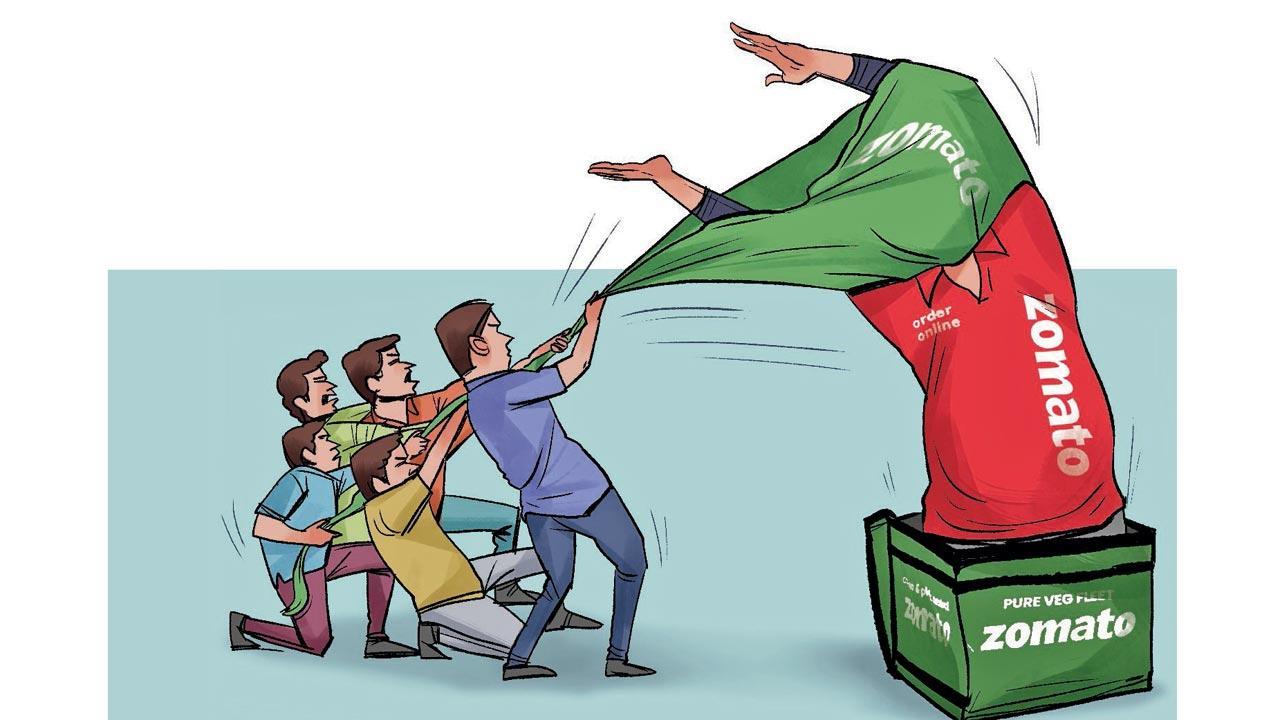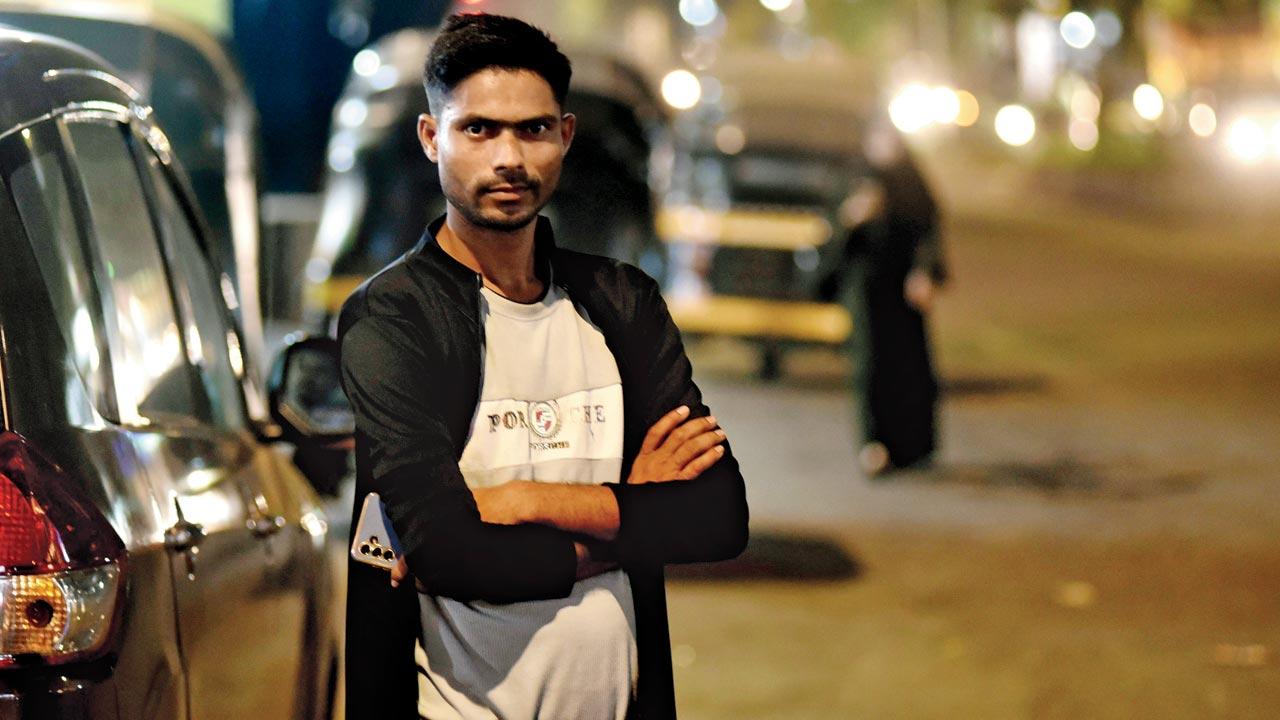Zomato’s decision to have a Pure Veg fleet has led us to further investigate if delivery partners agree with the logic behind this move

The public outcry over the green uniforms led to the company withdrawing the idea and sticking to red uniforms. Illustration/Uday Mohite
At 4.17 pm on March 19, Deepinder Goyal, CEO of food delivery partner Zomato, set off one of the most divisive debates in recent memory over the politics of food.
The first tweet of an eight-tweet thread—which at the time of writing this had over 40 crore views—seemed a general observation of how India has the largest percentage of vegetarians in the world who are particular about how their food is cooked. The second tweet held a glimpse of things to come: “To solve their dietary preferences, we are today, launching a ‘Pure Veg Mode’ along with a ‘Pure Veg Fleet’ on Zomato for customers who have a 100% vegetarian dietary preference.”
Crockery shattered for miles.
Goyal further elaborated on the company’s plan, which only deepened the fault lines. “Pure Veg Mode will consist of a curation of restaurants that serve only pure vegetarian food, and will exclude all restaurants which serve any non-veg item,” he added. The decision—clarified Goyal—was not meant to alienate any religious groups or political preferences.
Less than 24 hours later, Goyal rescinded green uniforms for the Pure Veg fleet, saying, “This will ensure that our red uniform delivery partners are not incorrectly associated with [only] non-veg food, and blocked by Resident Welfare Associations (RWAs) or societies on special days… our riders’ physical safety is of paramount importance to us.”
 Vivek Korde and Shahu Patole
Vivek Korde and Shahu Patole
The public discourse around the move was quick and equally diving. Supporters of it, felt heard. “True. Vegetarians feel most comfortable in eating and ordering from only vegetarian restaurants. The biggest concern is how their foods are handled. Whether separate utensils and oils are used or not?” commented X user Kamal Kumar.
The green uniform was recalled due objections raised like those by X user Kanthala Raghu, “I think Zomato is creating a new class of delivery drivers wearing green with green box, so they can be easily identified from the clothes they wear,” tweeted Raghu. Adding, “I am worried, the regular Zomato drivers will not be allowed to enter certain veg only societies? They will be beaten on the roads for ferrying non-veg food when there is a puja going on? Will they be harassed because they are delivering to an obvious non-Hindu customer? Not sure what the business impact of this decision would be, but ‘green fleet’ is a garbage approach from my perspective keeping in mind the current communal situation in the country,” she adds.
But, it’s business as usual for most drivers, as they can’t afford to stop. Like Sufraan in South Mumbai. The 25-year-old, who has been a delivery staffer for five years, says the air is thick with worry. “I found out when a fellow rider asked me whether I had been told anything by my team leader,” he says, in the middle of picking an order. “They might regret this.”
Sufraan feels the decision will create unnecessary enmity: “It’s creating an India-Pakistan-like situation. Dividing riders into vegetarian and non-vegetarian fleets is unnecessary; It will change the attitude of those delivering pure-veg items. I guess I will be on the lookout to see if anything happens to those of us delivering non-vegetarian food. I really hope that nothing does, but yes, I will be speaking to my friends who deliver too and see what to do next.” He pauses and ends with a sentiment common amongst gig workers, “As long as they don’t use this to reduce our money, I am okay with anything.”
 Dinesh Kasiyapur has swtiched from being delivery partner to driver. He saw a six-month ban because he delivered non-veg food to a vegetarian customer by mistake in a bid to complet his target for the day. Pic/Sameer Markande
Dinesh Kasiyapur has swtiched from being delivery partner to driver. He saw a six-month ban because he delivered non-veg food to a vegetarian customer by mistake in a bid to complet his target for the day. Pic/Sameer Markande
Most food delivery partners earn R800 to R900 per day, a monthly salary of R30,000 is the maximum after riding for 15 hours a day, says Dinesh Kasiyapur, who left Zomato one-and-a-half-year ago. “One busy day,” says the Jogeshwari resident, “I had a vegetarian and non-vegetarian delivery each. By mistake, I gave the non-vegetarian package to the client who had ordered vegetarian.”
The ordeal that ensued made him say, “never again”. “The vegetarian customer called and cussed at me,” he says about the incident that took place in 2022. “I apologised profusely. I was so harrowed because I just wanted to finish my target for that day. But the customer complained to the company, and the next day I was not able to log into the app. I got a notification saying an issue had been raised with my attitude. I went to the local office, and raised a ticket.” But Kasiyapur was banned from delivering for six months.
“I drove for Ola and Uber, but those six months were just agony,” he says. “I had no money, no answer about where I was headed,” he says, “When they allowed me to deliver again, I was just too disheartened.” The income from being a cabbie as well, after company deduction, is too low for the hours he puts in. The rising cost of fuel and disrespectful customers just isn’t worth the work with app-based aggregators.
A 2023 report by Fairwork India in conjunction with the Centre for Information Technology and Public Policy (CITAPP) and the Oxford Internet Institute, said, “There is no doubt that most platforms take a stance against the most egregious forms of bigotry by explicitly stating, in their consumers’ terms and conditions, that discriminating against workers will not be tolerated.” In one instance, when a consumer requested that their food not be delivered by someone from the Muslim community, the platform cancelled the order; and the CEO tweeted, “Food does not have a religion”.
However, the same platform later received flak for an advertisement that drew on a Dalit cinematic character to portray waste collection in a manner that was widely perceived as reinforcing demeaning occupational and caste stereotypes. The platform promptly removed the advertisement, claiming it only wanted to “spread awareness about the....benefits of recycling in a humorous way.” The report has also pointed out that 80 per cent of consumers in 12 Metro cities, including Mumbai, have said that they are aware that platform workers work long hours. While 66 per cent of consumers in the large cities strongly agreed that the government must act against platforms that repeatedly fail to offer their workers either fair pay or fair conditions.
Ganesh, a delivery agent in CBD Belapur, who preferred to share his first name only, sees no discrimination in separate fleets. “I’m vegetarian, but I have been delivering non-vegetarian food for over three years,” he says, “If there is such a provision, I will join the vegetarian fleet; I’m happy, the customer is happy.”
Activist Vivek Korde from Mulbhut Adhikar Sangharsh Samiti feels this is a very slippery slope. “A few years ago, people were very happy when housing societies disallowed those from non-majority communities to buy a home in their colony,” he points out. “Today, if you are from a majority community, but eat meat, you won’t be sold a flat. In Nazi Germany, one of the first discriminations against Jews was that they were told to walk on the left side of the road. It was justified with the reasoning: ‘They have a clear, uninterrupted side of the road to walk on.’ And this is my worry…”
Shahu Patole is no stranger to the political move of using food to flare up sentiments. The Dalit food historian feels that if we go into the history of what is vegetarian in India, too many skeletons will tumble out of the closet. “Vegetarianism in the Indian context is because of the Ayurvedic concept of Satvik, Rajasik and Tamasic. We have food that comes under each category. These are specific and indigenous to the Indian subcontinent. Neither was vegetarian pizza and pasta, which seems to be a popular dish in this list of approved or banned foods. Let us be honest and think about what we are doing with segregating people using the food we eat. Where are we headed as a society?” asks Patole.
We finally reached out to Irfan Shaikh, an ex-Swiggy rider. He has worked as a courier, and as a delivery person for an agro-food company, but has since moved back to his place of birth in Uttar Pradesh. “The gig economy, no matter which product—be it food, vegetables or ice-cream delivery—is not made for the hardworking man. It sucks you dry and spits you out. I will come back looking for a job in Mumbai, but I will not work in the gig industry anymore because they use us. They don’t care about us. We need to start thinking about ourselves,” he says.
 Subscribe today by clicking the link and stay updated with the latest news!" Click here!
Subscribe today by clicking the link and stay updated with the latest news!" Click here!










